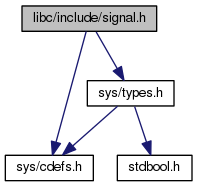|
TacOS
0.2
|
|
TacOS
0.2
|
Gestion des signaux. Plus de détails...


Aller au code source de ce fichier.
Macros | |
| #define | NSIG 32 |
| #define | SIGTYPES |
| #define | SIGHUP 0 |
| #define | SIGINT 1 |
| #define | SIGQUIT 2 |
| #define | SIGILL 3 |
| #define | SIGTRAP 4 |
| #define | SIGABRT 5 |
| #define | SIGBUS 6 |
| #define | SIGFPE 7 |
| #define | SIGKILL 8 |
| #define | SIGUSR1 9 |
| #define | SIGSEGV 10 |
| #define | SIGUSR2 11 |
| #define | SIGPIPE 12 |
| #define | SIGALRM 13 |
| #define | SIGTERM 14 |
| #define | SIGCHLD 16 |
| #define | SIGCONT 17 |
| #define | SIGSTOP 18 |
| #define | SIGTSTP 19 |
| #define | SIGTTIN 20 |
| #define | SIGTTOU 21 |
| #define | SIGURG 22 |
| #define | SIGSYS 30 |
| #define | SIGRTMIN 31 |
| #define | SIGRTMAX NSIG-1 |
| #define | SIG_BLOCK 0 |
| #define | SIG_UNBLOCK 1 |
| #define | SIG_SETMASK 2 |
| #define | SIG_IGN sig_ignore_handler |
| #define | SIG_DFL 0 |
Définitions de type | |
| typedef unsigned long | sigset_t |
| typedef void(* | sighandler_t )(int) |
Fonctions | |
| void | init_signals (void) |
| int | kill (unsigned int pid, int sig) |
| int | raise (int sig) |
| sighandler_t | signal (int sig, sighandler_t func) |
| int | sigsuspend (const sigset_t *sigmask) |
| int | sigprocmask (int how, const sigset_t *set, sigset_t *oldset) |
| int | sigemptyset (sigset_t *set) |
| int | sigfillset (sigset_t *set) |
| int | sigaddset (sigset_t *set, int signum) |
| int | sigdelset (sigset_t *set, int signum) |
| int | sigismember (const sigset_t *set, int signum) |
| void | sig_ignore_handler (int signal) |
Copyright (C) 2010, 2011, 2012 - TacOS developers.
This program is free software; you can redistribute it and/or modify it under the terms of the GNU General Public License as published by the Free Software Foundation; either version 3 of the License, or (at your option) any later version.
This program is distributed in the hope that it will be useful, but WITHOUT ANY WARRANTY; without even the implied warranty of MERCHANTABILITY or FITNESS FOR A PARTICULAR PURPOSE. See the GNU General Public License for more details at http://www.gnu.org/copyleft/gpl.html
You should have received a copy of the GNU General Public License along with this program; if not, see http://www.gnu.org/licenses.
| #define NSIG 32 |
Nombre de signaux.
| #define SIG_DFL 0 |
Utiliser le handler par défaut.
| #define SIG_IGN sig_ignore_handler |
Ignorer le signal.
| #define SIGABRT 5 |
Abort.
| #define SIGALRM 13 |
Signal raised by alarm.
| #define SIGBUS 6 |
Bus error.
| #define SIGCHLD 16 |
Fin processus fils.
| #define SIGCONT 17 |
Continue si arrêté.
| #define SIGFPE 7 |
Floating Point Exception.
| #define SIGHUP 0 |
Hang up.
| #define SIGILL 3 |
Illegal instruction.
| #define SIGINT 1 |
Interrupt.
| #define SIGKILL 8 |
Terminate.
| #define SIGPIPE 12 |
Write to pipe with no one reading.
| #define SIGQUIT 2 |
Quit and dump.
| #define SIGSEGV 10 |
Segmentation Violation.
| #define SIGSTOP 18 |
Stop l'exécution temporairement.
| #define SIGSYS 30 |
Bad syscall.
| #define SIGTERM 14 |
Termination.
| #define SIGTRAP 4 |
Trap.
| #define SIGTSTP 19 |
Terminal Stop.
| #define SIGTTIN 20 |
Le process en background essaye de lire le tty.
| #define SIGTTOU 21 |
Le process en background essaye d'écrire sur le tty.
| #define SIGURG 22 |
Urgent data available on socket.
| #define SIGUSR1 9 |
Signal utilisateur 1.
| #define SIGUSR2 11 |
Signal utilisateur 2.
| typedef void(* sighandler_t)(int) |
Type pour un handler de signal.
| void init_signals | ( | void | ) |
Mise en place des handlers par défaut.

| int kill | ( | unsigned int | pid, |
| int | sig | ||
| ) |
Envoyer un signal à un processus.
| pid | l'identifiant du processus. |
| sig | le signal à envoyer. |


| int raise | ( | int | sig | ) |
Envoyer un signal à l'appelant.
| sig | le signal à envoyer. |

| sighandler_t signal | ( | int | sig, |
| sighandler_t | func | ||
| ) |
Met en place un handler pour un signal.
| sig | le signal à catcher. |
| func | fonction handler à utiliser. |


 1.8.7
1.8.7